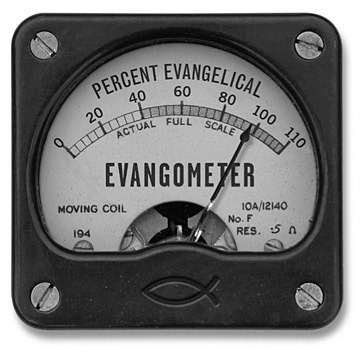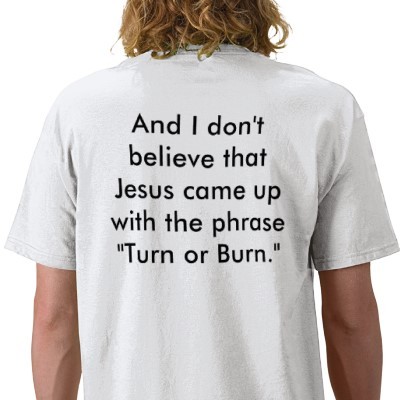Turn or burn
Imagine a conversation I have with a non-christian friend from Germany, talking about my dissertation and my studies at george-fox EVANGELICAL seminary, Portand, USA…
If I was asked by him about the EVANGELICAL in the name of the university I study at; if I was asked to define this „EVANGELICAL, what would I say? What would I answer my german non-christian friend?
I’d say, that it is a movement, that emerged in the 16th and 17th century in some European countries like England, Germany and some Scandinavian countries. And I’d say, that the movement developed to a broader significance and a changed focus in the States in the 18th and 19th century. I would also mention four main qualities that have been special marks of EVANGELICAL religion:
- Conversion (the belief, that lives need to be changed)
- Activism (the expression of the gospel in effort)
- Biblicism (a particular regard for the Bible)
- Crucicentrism (a stress on the sacrifice of Christ in the cross).
And I would be honest enough to admit that I stole the insight from a book I recently read a book about it. “Evangelicalism in Modern Britain. A History from the 1970’s to the 1980’s” by David W. Bebbington.
And my friend would then answer, that he knows the “EVANGELICALS” not particularly from the UK, but more from the news he sees about the USA. EVANGELICALS are those people demonstrating against abortion, they attack gay people and they carry signs, that announce hell, for every soul that isn’t converted to Jesus Christ yet. And my friend would get really angry.

I’d answer than most of these statements and demonstrations are strongly linked with the religious culture in the States. And that Evangelical religion has been molded by its environment from the 16th century till today in the particular countries it was prominent in.
My friend, after ordering the next beer, would then ask about the development process. How it actually occurred that an originally European movement changed into something most Germans would regard with suspicion. He’d than say, that he knows of some EVANGELICAL congregations Germany but that these have no large impact on the society in Germany.
I’d then tell more about the book I read on this issue. And on how the author David Bebbington enfold the large impact the history, culture and environment in a changing western society has on a religion. Conservative, liberal and post-evangelicalism do vary in their theology, self-image and prominence. After my 30 minute monologue, my friend would then ask, what “evangelical” means.
And I would answer: The term evangelical has its etymological roots in the Greek word for “gospel” or “good news”: ευαγγελιον (evangelion), from eu- “good” and angelion “message”.

After finishing his beer, my friend would express his disillusion: What a pity, the good news is actually a pretty cool thing, what a shame, what we turned it into. Perhaps our culture isn’t ready for something good and turns it into something exclusive, aggressive and weird, just because we are not used to it. Perhaps we are more used to hate than to love…
Actually this conversation isn’t fiction. It already took place a lot of times. It shows the cultural differences and the different impact religious topics have in daily life in the United States and Europe (especially Germany).
PS: The Blog I stole the “evangometer” from is awesome. You should check it out, not only because of the picture, but because of these two articles: Saving Evangelicalism and Saving Evangelicalism Part Two
Leave a Reply
You must be logged in to post a comment.